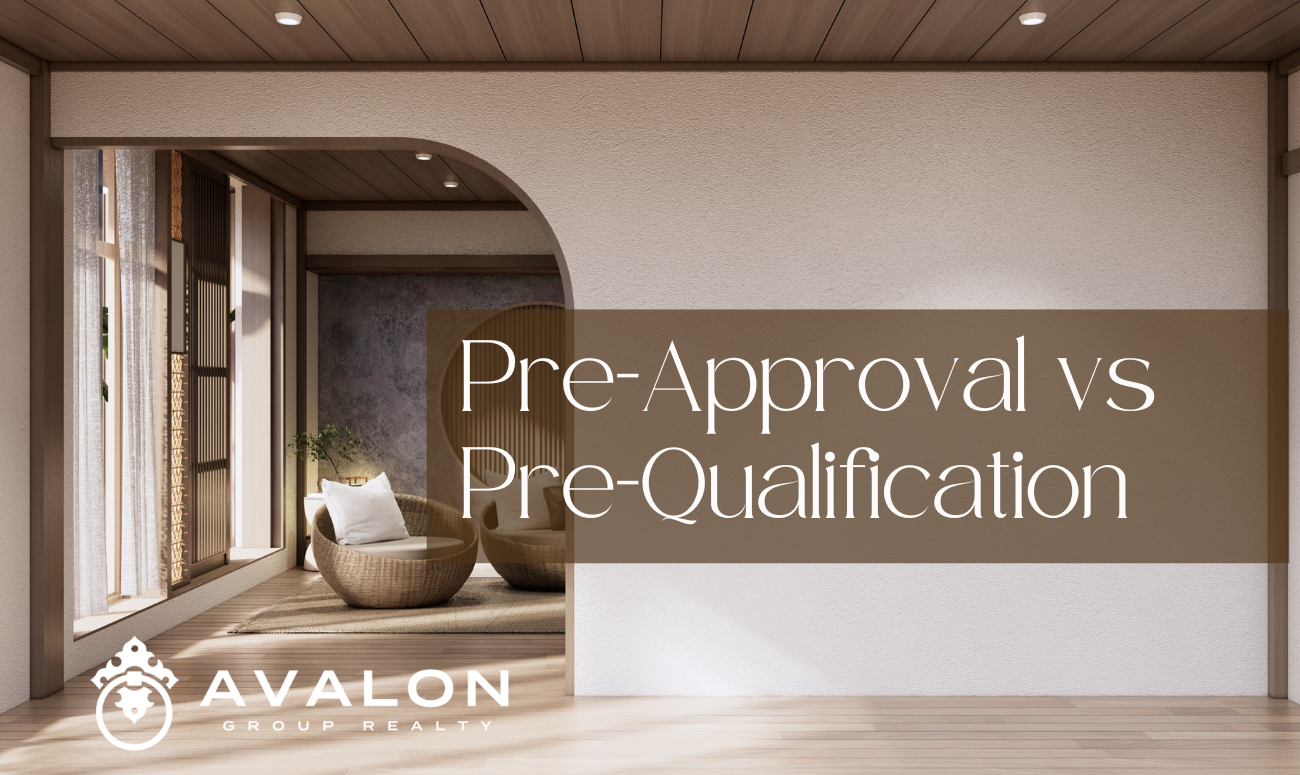Pre-Approval vs Pre-Qualification: Your Key to Homebuying Success
Navigating the mortgage process can be overwhelming, especially when terms like “pre-qualification” and “pre-approval” start popping up. As a Realtor at Avalon Group Realty in St. Petersburg, FL, I understand how crucial it is for homebuyers to differentiate between these two terms. While both are essential in securing a mortgage, they serve different purposes and carry varying weight in the homebuying process.
Today, we’ll delve deep into the distinctions between pre-approval vs pre-qualification, why they matter, and how you can leverage them to secure your dream home.
What is Pre-Qualification?
The first step in most homebuying journeys is pre-qualification. It’s essentially a high-level overview of your finances that helps you understand how much of a loan you might qualify for. Typically, pre-qualification is a quick and easy process. You provide the lender with basic information about your income, assets, and debts—often over the phone or through an online form.
This step is usually free and does not involve a credit check. The lender uses the information you provide to offer a general estimate of how much you can borrow. However, it’s essential to understand that pre-qualification is based solely on the information you supply, meaning it lacks the depth and scrutiny of a full mortgage application.
Advantages of Pre-Qualification
One of the biggest advantages of pre-qualification is that it allows you to get a rough idea of your buying power without going through the full mortgage application process. “Pre-qualification gives you a general sense of your financial standing,” explains Pam Amante, a fellow Realtor at Avalon Group Realty. “It’s a great starting point for buyers who want to gauge their affordability before diving deeper into the homebuying process.”
Additionally, pre-qualification allows you to discuss mortgage options with your lender. Based on the information you provide, the lender can recommend loan products that may be a good fit for your needs. This is also an excellent opportunity to ask questions about interest rates, down payments, and other mortgage-related topics.
Limitations of Pre-Qualification
While pre-qualification is helpful, it’s important to remember that it’s not a formal or binding commitment from a lender. Because the lender hasn’t verified your financial information, pre-qualification doesn’t carry as much weight as pre-approval. Sellers typically view pre-qualification letters with less confidence than pre-approval letters, particularly in competitive real estate markets.
In fact, some real estate markets may not take a pre-qualification letter seriously at all. Aaron Hunt, Broker at Avalon Group Realty, highlights this distinction: “While pre-qualification gives buyers a ballpark figure, it doesn’t guarantee loan approval. Sellers want to see that you’ve taken the next step with pre-approval, which involves a more thorough examination of your finances.”
What is Pre-Approval?
The next, more detailed step in the mortgage process is pre-approval. Unlike pre-qualification, pre-approval involves a formal mortgage application. You’ll be asked to provide a lender with detailed financial documentation, including pay stubs, tax returns, and bank statements. The lender will also perform a credit check to assess your creditworthiness.
Pre-approval is more comprehensive than pre-qualification because the lender is verifying your financial information and committing to offering you a loan, pending certain conditions. After reviewing your documents, the lender will give you a specific loan amount that you’re pre-approved for, often locking in an interest rate.
In many ways, pre-approval functions as a conditional commitment from the lender. It shows sellers that you’re not just estimating how much you can borrow—you’ve gone through the necessary steps to ensure you’re qualified.
Advantages of Pre-Approval
Pre-approval is a game-changer for buyers, especially in a competitive market like St. Petersburg. When you’re pre-approved, you have a significant edge over buyers who are only pre-qualified. Sellers are more likely to take your offer seriously, knowing you’ve already been vetted by a lender.
“Pre-approval is what separates serious buyers from the rest,” Aaron Hunt says. “With pre-approval, you’re showing the seller that you’re ready and able to close the deal. It can be the deciding factor in a multiple-offer situation.”
Additionally, being pre-approved allows you to act quickly when you find the right home. In fast-paced markets, homes can get snapped up quickly, and being pre-approved ensures you can move swiftly and confidently.
Another benefit is that pre-approval provides a clear picture of your budget. Since the lender has already reviewed your financial situation, you know exactly how much you can borrow, which allows you to focus your home search on properties within your price range.
The Pre-Approval Process
The pre-approval process is more thorough than pre-qualification, but it’s worth the effort. Here’s what to expect:
- Application: You’ll start by filling out a formal mortgage application, either online or in person.
- Documentation: You’ll need to provide financial documents, such as tax returns, pay stubs, bank statements, and information about your debts and assets.
- Credit Check: The lender will pull your credit report to assess your credit score and credit history.
- Verification: The lender will verify all of the information you’ve provided to ensure accuracy.
- Loan Amount: Once everything is reviewed, the lender will provide you with a pre-approval letter stating the specific loan amount you qualify for.
At this point, you’ll be in a strong position to make an offer on a home. However, it’s important to remember that pre-approval is not the final loan approval. The lender will still need to complete the underwriting process and approve the home’s appraisal before issuing the final loan.
Why Pre-Approval vs Pre-Qualification Matters
Understanding the difference between pre-approval vs pre-qualification is essential for any homebuyer. While pre-qualification is a helpful first step, it doesn’t provide the same level of assurance as pre-approval. Sellers want to work with buyers who have taken the time to go through the pre-approval process because it shows they’re financially capable of closing the deal.
Key Differences Between Pre-Approval and Pre-Qualification
To sum up the differences between pre-approval vs pre-qualification:
- Pre-Qualification: Based on self-reported financial information, no credit check, offers a rough estimate of your loan amount.
- Pre-Approval: Requires a formal mortgage application, involves a credit check, provides a conditional commitment from the lender.
In a competitive market like St. Petersburg, being pre-approved can be the key to getting your offer accepted. Pam Amante points out, “Pre-approval isn’t just about securing a mortgage; it’s about positioning yourself as a serious buyer in the eyes of the seller.”
How to Get Started
If you’re ready to take the first step toward buying a home, consider getting pre-qualified or pre-approved as soon as possible. While pre-qualification is a good starting point, moving on to pre-approval will put you in the best position to compete in a competitive real estate market.
At Avalon Group Realty, we work closely with trusted lenders to help our clients navigate the mortgage process with ease. Whether you’re just starting your home search or are ready to make an offer, we’re here to guide you every step of the way.
Final Thoughts on Pre-Approval vs Pre-Qualification
In the world of homebuying, understanding the differences between pre-approval vs pre-qualification can make all the difference. Pre-qualification gives you a rough idea of your loan potential, while pre-approval is a more formal, verified step that shows sellers you’re a serious buyer.
In today’s competitive market, being pre-approved can give you the edge you need to stand out from the crowd. So, if you’re serious about buying a home, don’t just stop at pre-qualification—get pre-approved and be ready to make your dream home a reality!
For more information or to start your home search today, visit AvalonGroupTampaBay.com or call 727-262-7920. Let us help you find your perfect home in the St. Petersburg area!




